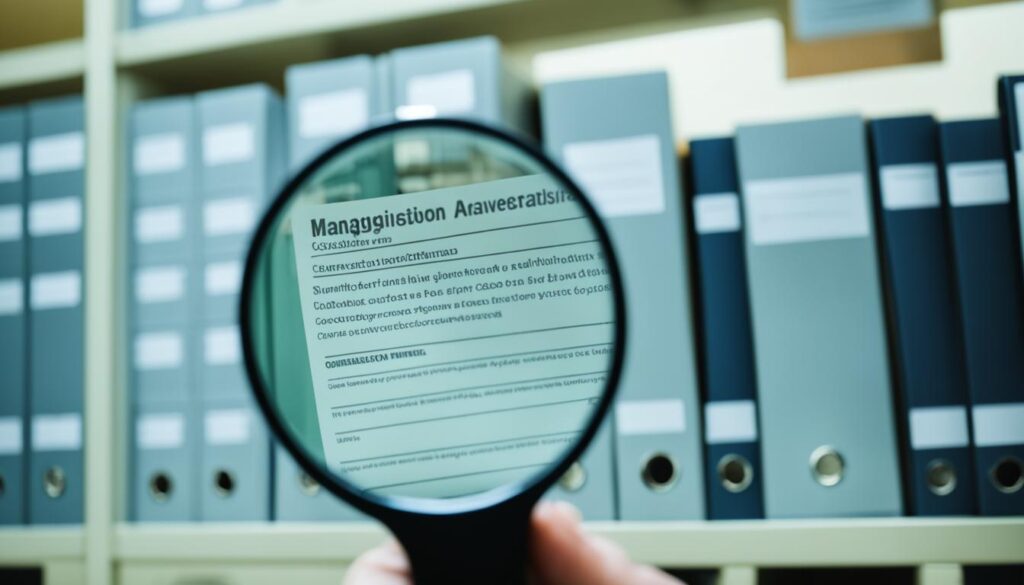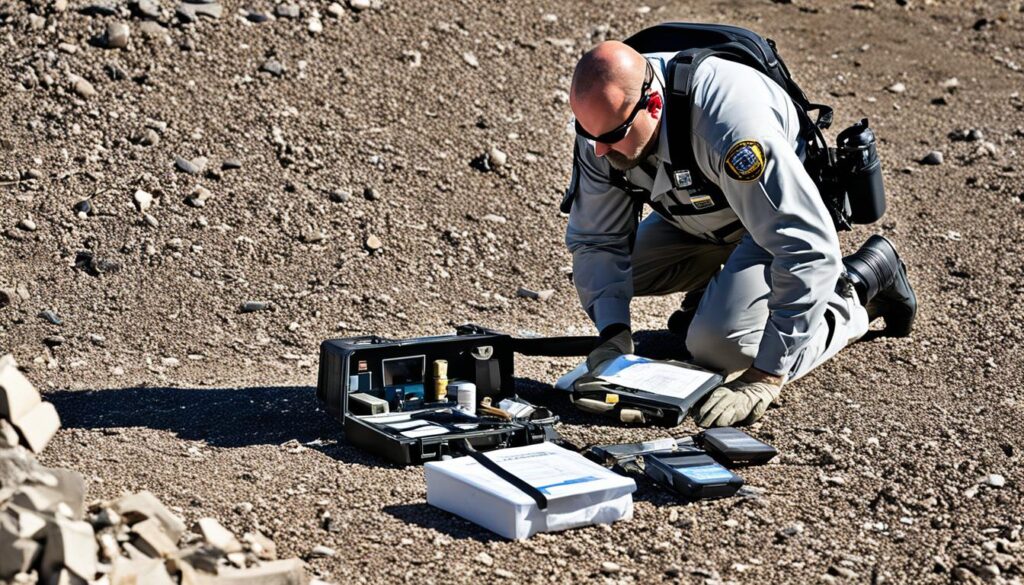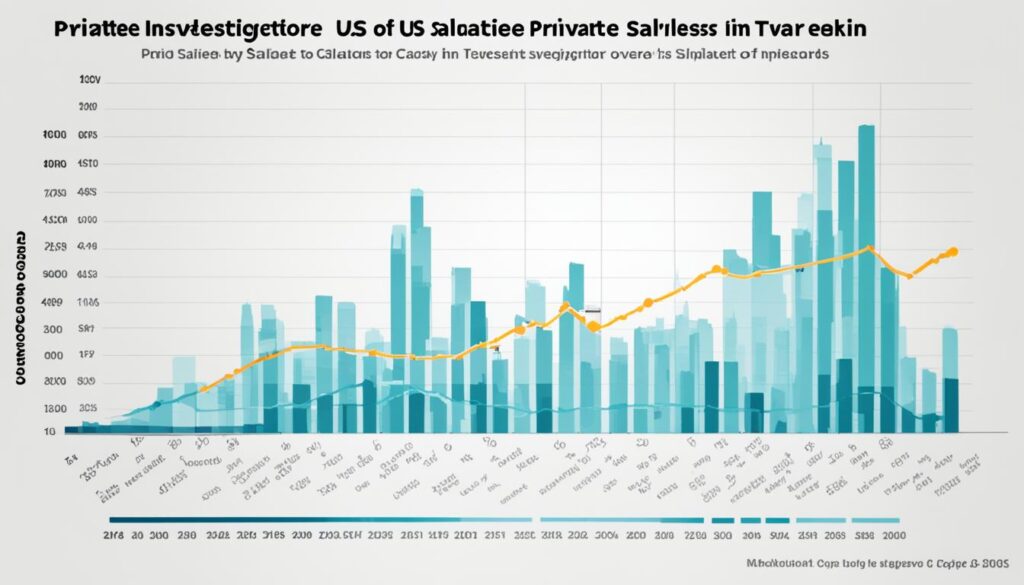Discover the essential steps on how to become a private investigator in the US. Learn about salary, skills, and job outlook in this complete guide on how to become a private detective
Choosing to become a private investigator opens doors to a profession where every detail matters. This world is full of stories waiting to be uncovered. You mix the thrill of the chase with deep thinking. With a talent for investigative work, you’re ready to jump into an exciting career. If checking backgrounds or following clues excites you, then becoming a private investigator might be the right path for you.
So, what are the steps to becoming a private eye and what does one need to learn? With just a small percentage of schools meeting the top standards, the journey isn’t easy. Yet, more than 6,000 schools stand ready to help you become a top-notch detective1. To make it in the detective world, you must be a master of many skills. A private investigator needs to handle everything from talking to people to understanding laws. It’s vital for the job.
Key Takeaways
- Discover the critical importance of selective education in the field of private investigation.
- Learn about the skill diversity that sets successful private investigators apart.
- Understand why comprehensive training is a gateway to becoming a trusted PI.
- Explore the role of professional certifications in elevating your investigative career.
- Gain insights into the job outlook and salary expectations for private investigators.
Discovering the Role of a Private Investigator
Starting a private investigator career combines surveillance, fact-finding, and deep thinking. You help all kinds of people, from regular folks to big companies, by understanding criminal justice and using cool investigative techniques. Private investigators are like puzzle solvers. They work hard to find the truth in tough cases, digging deep into lots of info.

In a private investigation business, the key is being great at finding and checking data. This can be doing background checks or keeping an eye on someone. To do this job, you need to gather and understand info quietly and well. A private investigator’s tools include talking to witnesses, looking at official records, and connecting the evidence to understand what’s going on.
Building a network with other private investigators can be a huge help. It lets you share tips and info that just might solve tough cases.
One big way to get noticed is by having a great website and using social media. This can draw in new clients and make you look trustworthy. More people getting interested in your work and talking about it, thanks to what you post online, shows how key these tools are..
- Knowing your way around different privacy laws and rules is a must. These can change a lot from place to place.
- Keeping your knowledge fresh and learning new things keeps you good at what you do. This keeps your work up to standard and legal.
The field of private investigation is always changing and growing. This makes the need for smart and mindful professionals high. To be successful, you need to be detailed and very careful. Also, you must be committed to doing your work with honesty and meeting your duties the right way.
Mapping Your Educational Journey to Become a PI
Starting a career as a private investigator (PI) mixes schooling, practical learning, and fitting within legal rules. This journey needs a solid framework surrounded by various legal and organizational standards.
The Minimum Education Requirements
Getting a high school diploma or GED is the first step to being a PI. This meets the basic needs for getting a license in most states. Yet, it’s good to know that having more education than this is often preferred by employers.
Advanced Degrees to Broaden Opportunities
If your goal is to grow in the field, think about getting an advanced degree in criminal justice or a related field. Schools in Arizona, from Tucson and beyond, have about 30 programs for private investigation enthusiasts. These higher education options not only improve your resume but also deepen your knowledge of criminal law, behaviors, and investigative methods. Studying online or through distance programs makes it accessible to more people
Discover timeless elegance with the Bulova Men’s Classic Hand Automatic watch.

The Role of Criminal McDegree in Criminal Justice
Taking a criminal justice program does a lot. It meets many licensure requirements and boosts your chances at snagging high-quality jobs in the PI sector. Courses often include work with private investigation businesses, giving you essential real-world practice.
Holding an advanced degree raises your job offers and promotion opportunities in both government and private sectors. This is because of the specialized knowledge and experience you gain.
The private investigation field changes fast. So, staying up to date with continuing education and training programs is key. These courses help you keep up with the newest laws, tech updates, and investigation tactics. Things like getting certifications like CLI or CFE make your resume stronger.
Realizing the tough path to getting a PI license shows the value of a good education and smart professional choices. By always learning and putting in hard work, you can cut through the complexities of this job and find lasting success.
Developing the Core Skill Set for PIs
To become a top private investigator, you need a variety of skills. Each state has strict rules for licensing PIs. They must know both old and new ways of investigating.
Communication and Interviewing Proficiency
Being good at talking to people is key for private eyes. Talking with witnesses and cops is crucial. It helps to win their trust and get important facts.
Analytical and Research Aptitude
Private eyes must be sharp thinkers. They analyze loads of info to solve cases. They dig deep into data and connect the dots.
Building Technological Expertise for Investigative Work
Technology is a game-changer for PIs. They use gadgets like GPS and cameras. These tools help them do detailed surveillance and gather key info.
If you’re starting out or want to grow in this field, learning both basic and high-tech methods is vital. It’s how you build a strong foundation in private detection.
Understanding Legal Framework and Ethical Conduct
Starting a career in private investigation means knowing the law well. You must understand legal rules and high ethical goals. Getting a state license is key, which asks for exams and experience. This shows that following laws and being ethical is crucial for trust and honor in this field. The work might test your ethics, especially with secret cases.
Some private investigators might use illegal methods for information, like secret filming or tracking. They might hire unlicensed partners or lie to get bank records, breaking ethical rules. These bad moves hurt the detective field’s name. This is why it’s crucial to always learn about laws and stay ethical.
From my time as a private investigator, I’ve seen how sticking to ethics builds trust. It means not doing wrong things like lying to get data or hacking into computers, even if it looks easy at first
- Licensure ensures that the rules and practices are followed.
- Learning about law changes in criminal justice is critical.
- Working in the police shapes respect for privacy and investigation law.
We should look at what future private investigators need to avoid to be legal and honest:
| This can lead to legal problems and fines | Risk to Reputation | Legal Consequences |
|---|---|---|
| Bribing witnesses | It damages how others see you, a big hit on trust | Can lead to criminal charges |
| Illegal tracking and surveillance | It makes clients lose faith in you | Can face legal fines and judgments |
| Hiring unlicensed subcontractors | It harms how trustworthy your business seems | Can lead to legal problems and fines |
Knowing and living by the PI industry’s moral rules makes for a respected career. We, as private investigators, see following laws as central to who we are.
Gaining Valuable Experience in the Field
In my journey to be a great private detective, I’ve learned you need diverse work experience. This type of work helps you get ready for the surprises of the job.
Transitioning from Law Enforcement to PI Work
Switching from police or military work to being a private detective makes sense. The skills in watching and upholding the law are very similar. A lot of my friends moved from traditional police work to this area, using their experience well. Both jobs need a lot of focus and paying attention to small details.
Internships and Junior Investigator Roles
I think internships are crucial for entering the private investigation field. These are usually with experienced detectives or firms. They teach you a lot and help you start your career. In these roles, you do a bit of everything. If you work hard and get your license, you might even get a full-time job out of it.
Navigating Private Sector Opportunities
Being in private investigation lets you try different types of cases. I’ve worked on simple surveillance to complex law cases. These experiences build your skills and make you more employable.
Now, there’s a good need for private investigators. They blend technology skills with people skills. Training, like what NITA offers, helps you get ready for this mix through science, law, and investigation lessons.
- Hands-on surveillance practice
- Legal and ethical training modules
- Advanced investigative techniques
I stay on top of my game by always learning. Sticking to the rules keeps me legal while knowing the latest in my field keeps me sharp.
How to become private investigators
Starting a career as a private investigator means you need to know how to get certified. This includes getting a license and going through some training. I’ve gathered info to help anyone interested in this line of work know what to do.
| To become a private eye, gathering experience is key. You should work in the field for at least 6,000 hours, or three years. This is important when you want to apply for a license. For example, in California, by 2021, there will be more jobs for PIs – from 4,200 in 2019 to an estimated 4,300. The pay for private investigators is also an important factor. In California, for instance, the middle pay was $68,598 in 2020. The top earners made about $106,300. Salaries can differ a lot based on where you work and what your specialty is. | o get your license, you have to pass a tough test. It’s a two-hour test with questions on many investigative topics.. Also, if your job includes using a gun, you need extra training. This includes an eight-hour course on arresting powers and a 14-hour course on gun safety. People often ask about what training is needed to be a PI. One test you might have to take is the Professional Certified Investigator (PCI) exam. It’s tough, with 125 questions to be answered in 2.5 hours. | If you’re a private investigator with a gun, you must have insurance. It’s called commercial general liability insurance, and you need at least $1,000,000 in coverage Becoming a PI means you have to follow a set process. This ensures that only those well-prepared and ethical can work in this field. The profession expects a high level of skill and conduct from its members.Here’s a table showing the main steps to becoming a licensed private investigator: |
| Requirement | Detail | Notes |
|---|---|---|
| Experience | 6,000 hours of investigative work | Mandatory for licensure |
| PI Exam | 2-hour multiple-choice test | Covers a variety of topics |
| Firearms Training | 22 hours (combined training hours) | Necessary for carrying firearms |
| Salary (2020) | Median in California: $68,598 | Top earners can make up to $106,300 |
| PCI Exam | 125 scored questions | 2.5 hours to complete |
Being a private eye isn’t just about knowing the law and getting a license. It’s also about being ethical. This ensures the quality of investigations and the reputation of the profession.
Certification: Elevating Your Professional Standing
For a private investigator (PI), getting certified is a big boost. It’s not just a requirement. It boosts your career and skills and shows you’re a pro. The National Association of Legal Investigators offers respected certifications, like CLI and PCI. These show you’re skilled and help you keep growing professionally.
Choosing the Right Certification Body
Choosing the right certification is crucial. The CLI from the National Association of Legal Investigators is known for its high standards and the strong community it offers. To get certified, PIs need to pass a tough exam and follow an ethical code. They also need to write a report showing their investigative skills. This step proves they can handle tough cases.
The Benefits of Being a Certified Legal Investigator (CLI) or Professional Certified Investigator (PCI)
Having a CLI or PCI certification has many advantages. These titles show you can handle secret info, conduct detailed investigations, and follow strict ethics. With these certificates, PIs can prove their commitment to high standards and honor their profession. It also means staying updated with new investigative methods and laws through ongoing training.
Navigating the Certification Processes
The steps to get certified might feel overwhelming at first. You must meet certain education and work experience levels before taking the exams. Afterwards, keeping your certification means staying up-to-date with more training and meeting recertification guidelines. This shows your ongoing dedication and the ability to grow with changes in the PI world.
To wrap up, pursuing a private investigator license and aiming for advanced certifications shows a commitment to ethics, expertise, and continual career advancement.
Bulova Ladies Rhapsody Diamond Quartz Bracelet Watch

Exploring Specialized Fields within Private Investigation
Private investigators often work in special areas like finding missing people or looking into fraud. This work needs expert skills and a deep understanding of the field they’re focusing on.

| When it comes to finding missing persons, investigators must understand both the emotional and practical sides. They use digital tools and search methods to find people. This job requires being really good at investigating and keeping things quiet. Corporate espionage is about finding out if businesses are stealing each other’s secrets. This work needs great observation skills and knowing how companies work. It’s about finding and stopping dishonest actions that could hurt a company’s success. | Insurance fraud work is detailed and involves looking closely at claims. The goal is to spot fake claims and scams. Investigators need to be thorough and know a lot about the law and insurance to do this well. Working in criminal investigations means private investigators often help the police. They do things like watch people or collect evidence. This job takes bravery and the ability to keep secrets. Focusing on one area in private investigation lets professionals offer even better help. This might be finding insurance fraud or helping track down missing people. Specializing means they have the right skills and knowledge for their job. | To get ready for these special jobs, private investigators have to study and train hard. This usually means more than 50 hours of training and meeting state rules. Having a degree in something like criminal justice can make it easier to find work Right now, there are a lot of chances for private investigators to find jobs. There’s a 6% more jobs expected in this field by 2032. Being good with new technology is also a big plus in this job. Private investigation is an interesting and important career. Each path within it offers different ways to make a strong impact every day. |
Mastering the Tools and Technology for PI Work
Technology is changing the way private investigators work. It makes computer skills and knowledge of digital records crucial. A good investigator has to know how to use databases, GPS trackers, and surveillance gear expertly.
Investigators now heavily rely on databases for checking backgrounds and finding criminal records. These databases make investigations faster and give easy access to important information online.
Surveillance is still key in this work. Thanks to modern GPS trackers, tracking someone’s location has become easier without always watching them. This advancement makes work more efficient and keeps in line with privacy laws.
Embracing technology not only enhances operational capabilities but fundamentally reshapes how investigations are conducted.
Staying up-to-date with tech is very important for me. Keeping my skills sharp lets me tackle tough cases with digital records and advanced software.
There’s a lot to learn about different tech tools. I find it important to always learn and practice with new technology. This helps me stay ahead in the private investigation field.
Contract reviews show how technology improves tracking and managing important documents. It demonstrates how wide-reaching technology is in our field.
| Tool/Technology | Use in PI Work | Benefits |
|---|---|---|
| GPS Trackers | Location tracking | Remote surveillance efficiency |
| Databases | Access to public records | Speed and accuracy in information retrieval |
| Surveillance Equipment | Visual monitoring | Comprehensive detail capture |
Even with all the gadgets, my work’s success also relies on knowing how to use them correctly and ethically. This keeps my work honest and helps me solve cases.
Assessing the Private Investigator Salary and Financial Outlook
Being a private investigator requires good detective skills and knowing about financial outlook and salary information. Latest data says they make around $52,120 a year, which is pretty good.
Considering average hourly pay shows a clear picture. It’s about $25.06. Pay varies by where you work, what education you have, and how much experience you have. Places like California usually pay more because it’s expensive to live and work there.
The future for private investigators looks bright. There’s a predicted 6% job growth by 2032. This means more work for those skilled at handling tough and secret cases.
To be a private investigator, you need to plan and get the right training. Most places will require a license. This usually means having work experience in a similar field. Professional certification is also important. It shows you are serious about your job and are always learning
Holding a degree in fields like criminal justice can help you earn more in the long run. It opens doors to higher paying jobs in investigations. This boosts your future financial outlook in this field.
Educational programs and hands-on training are key. Many tech boot camps are available and can teach you investigation skills. These skills are crucial for managing and showing cases effectively.
| Component | Impact |
|---|---|
| Geographic Location | Higher salaries in states like California |
| Educational Attainment | Higher earning potential with degrees in criminal justice |
| Experience Level | More experience correlates with increased hourly rates |
| Certification | Professional recognition can lead to better opportunities and pay |

Private investigators do well financially and have good job prospects. It’s a career that combines hard work and education with good earnings. The right mix of skills, experience, and education can lead to success in this field
Building a Sustainable Career as a Private Investigator
| To start a career as a private investigator, it’s key to understand the steps to get licensed. You need a mix of schooling, hands-on training, and real-life cases to do well in this job of mysteries. Becoming a great private eye involves learning about many rules and getting the right education. One important rule is the age limit, which changes by state. For example, in New York, you have to be 25 to apply. Also, having a criminal justice degree from an OK school can let you skip some experience steps. To get a license, a private eye must pass a heavy background check that includes fingerprints and checking for any past criminal acts. Sometimes, if one state isn’t your home but has an agreement with your state, you can work there temporarily without a new license. Getting licensed can take up to three months, influenced by checking over your business plan and your insurance paperwork. | Improving your skills is a must for a solid private eye career. Things like being certified by groups like ASIS International or the National Association of Legal Investigators really show you’re serious about your job. It’s not just about getting a pat on the back. It’s about showing you believe in high ethics and always growing professionally. As for jobs, working in private investigation offers lots of different areas like looking into insurance fraud, fighting cybercrime, and checking up on companies. Picking a focus can really help you earn more and keep your job for a long time. You can get the skills you need through special training for each area. Staying up-to-date on new ways to investigate through learning and real cases is very important. Going to talks and classes can give you new skills and keep you sharp in your job. | Finally, it’s crucial to follow all the rules and be ethical in your work. Being honest and working within the law not only makes you better at your job but also makes sure the work you do is always right. In short, to be a successful private investigator, you need more than just a license. You must keep learning, follow the law, and be dedicated to growing professionally. This makes for a strong and rewarding career, perfect for those who love a challenge and want to do good work in the world. |
Conclusion
| Starting as a private investigator requires a mix of learning, on-the-job experience, and following the law. Many people hire private eyes, showing how important they are. After teaching for seven years, and now working in criminal justice, I know a degree in criminal justice can help a lot. This job is often chosen by people in their second or third career, even ex-law enforcement. | Private investigators have a wide range of tasks, need to keep up with changing technology. Jobs like cyber intel are for those who want to fight online crime. Rachele Davis found success using online tools to find info and attract more clients. To be good at this job, you need varied skills. This means always learning and being aware of the market. | Becoming an investigator is not a set path; it’s full of chances and ways to grow. Having a degree is more than a checkmark—it opens doors to learning and get better in a job focused on truth. There will be about 3,000 new PI jobs soon, showing it’s a growing fiel. So, to those who are brave and curious, the world of private investigation is open. It’s where your questions meet real goals. |
FAQ
What are the initial steps to becoming a private investigator?
To start, get a high school diploma or GED. Then, think about studying criminal justice in college. It’s also smart to look into what your state requires for a private investigator’s license. If you’ve worked in law enforcement or legal jobs before, that’s a plus.
What kind of work can I expect as a private investigator?
You’ll do a mix of tasks. This includes watching people, checking backgrounds, finding missing individuals, and collecting evidence for court. Your clients might be average people, businesses, or lawyers.
Can I be a private investigator without a degree in criminal justice?
Yes, you can enter the field without a criminal justice degree. But, some level of education and training is mandatory in most states. Relevant work experience, especially from law enforcement, can help too.
What kind of skills do I need to be successful in private investigations?
Key skills include good communication, problem-solving, and the ability to find and understand information. You’ll also need to be comfortable with using technology and know the laws and ethics of the job.
Are there different licensure requirements for private investigators in the US?
Each state has its own rules for licensing private investigators. The process often involves a mix of education, work experience, and a state exam. Some states also demand that PIs keep learning and follow a code of ethics.
How can I gain experience in the field of private investigation?
Start by interning at an investigative agency or working in a lower investigator role. Transitioning from law enforcement is common. You can also get related experience in other fields or take special training.
Are certifications important for a career as a private investigator?
Certifications like CLI or PCI can boost your standing and show your deep knowledge. To get certified, you usually have to pass an exam, show experience, and keep learning.
What are some specialized fields in private investigation?
There are many areas you can focus on, such as fraud, finding missing people, corporate investigations, and criminal activities. Specializing helps you stand out and offer more targeted services.
What technology do private investigators use?
Today’s PIs use tools like hidden cameras, GPS devices, and software to examine computers. They also depend on various databases for their work. Knowing how to efficiently use these tech tools is crucial for success.
What is the financial outlook for a private investigator?
PI salaries range widely but several factors influence this, including where you work and what you specialize in. The median salary in the US is about $50,402 per year. Areas like California often pay more due to high living costs.
How do I build a sustainable career as a private investigator?
To have a long-lasting career, keep learning and stay up-to-date on new tech and techniques. Gain more experience, maintain your licensure, and consider getting certified. And always work with integrity and a focus on growing professionally.
Women’s Watch, Classic Crystal Diamond Design Quartz Simulated Women’s Watch, White Breathable Leather Strap Rose Gold dial Women’s Watch
Original price was: 22.99$.14.99$Current price is: 14.99$.Women’s Watches Bracelet Dial Ladies Fashion Dress Quartz Wrist Watch Oval Square Round Mini Women Watch Waterproof Gifts for Women
47.90$Yaheetech Boucle Accent Chair, Modern Fabric Armchair, Comfy Fluffy Barrel Chair, Reading Chair with High Folding Backrest and Metal Legs for Living Room/Bedroom/Home/Office, Gray
Original price was: 109.99$.64.99$Current price is: 64.99$.Yaheetech Desk Chairs with Wheels/Armrests Modern PU Leather Office Chair Height Adjustable Home Computer Executive Chair on Wheels 360° Swivel – Pink
Original price was: 89.98$.67.65$Current price is: 67.65$.
Source Links
- https://www.forbes.com/advisor/education/law/become-a-private-investigator/
- https://pursuitmag.com/how-became-private-investigator/
- https://atlantisinvestigations.com/articles/becoming-a-private-investigator
- https://www.saintleo.edu/about/stories/blog/criminal-justice-careers-what-its-like-to-be-a-private-investigator
- https://bondinvestigations.com/a-guide-for-the-private-detective-in-training/
- https://www.centreforsecurity.com/11-skills-of-an-effective-private-investigator/
- https://diligentiagroup.com/legal-investigation/ethics-the-law-and-legal-limits-for-private-investigators/
- https://investigativeacademy.com/how-you-can-build-experience-to-become-a-private-investigator/
- https://www.bsis.ca.gov/forms_pubs/pi_fact.shtml
- https://privateinvestigatoredu.org/california/
- https://www.accreditedschoolsonline.org/criminal-justice/private-investigator/
- https://frugallivingtalk.com/2024/04/20/executed-contract-review/
- https://www.50states.com/education/careers/how-to-become-a-private-investigator/
- https://www.bls.gov/ooh/protective-service/private-detectives-and-investigators.htm
- https://www.wolterskluwer.com/en/expert-insights/how-to-get-a-private-investigator-license
- https://www.gcu.edu/blog/criminal-justice-government-and-public-administration/how-become-private-investigator
- https://www.linkedin.com/pulse/what-does-future-hold-private-investigators-sabrina

















No responses yet